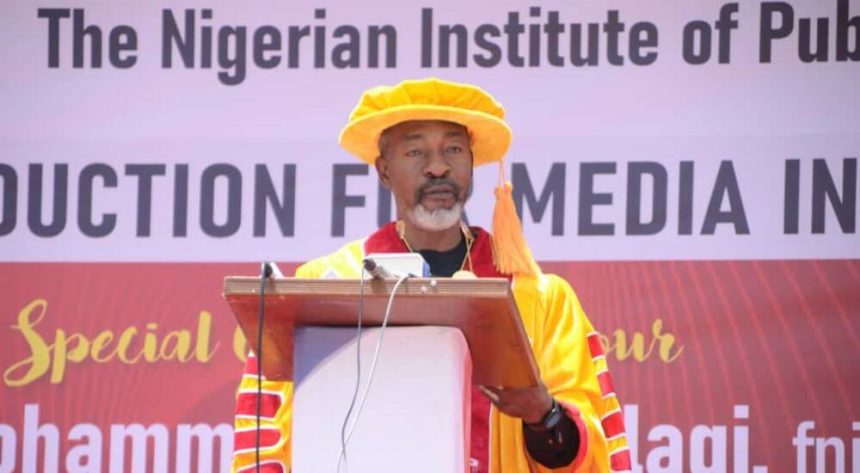Reclaiming Nigeria’s Global Reputation: An Urgent Task for Nigeria Reputation Management Group and Imperative for National Progress
By: Eric Adile
As Nigeria continues its efforts to implement the 2030 Agenda for Sustainable Development, the country faces a critical challenge that threatens both its global standing and its ability to achieve the Sustainable Development Goals (SDGs): its deeply entrenched negative reputation. Nigeria, Africa’s most populous nation and largest economy, has been marred by a global image associated with corruption, insecurity, and inefficiency. This reputation not only hampers its economic growth and international relations but also negatively affects its citizens’ global mobility, trust in governance, and overall development potential.
As the Nigerian Institute of Public Relations (NIPR), led by its President and Chairman of Council, Dr Ike Neliaku, prepare to inaugurate the Nigerian Reputation Management Group (NRMG), a bold step toward addressing this reputation crisis. An initiative that must be fortified against political interference and backed by decisive, strategic action from key institutions to succeed. This investigative piece explores the urgent need for a reputation shift for Nigeria, the negative impacts of the country’s image on its social and economic development, and the steps needed to ensure the NRMG can meet its objectives.
The Burden of Nigeria’s Negative Reputation
Nigeria’s image crisis has been decades in the making, with global perceptions often tied to issues such as rampant corruption, chronic insecurity, and inefficiency in governance. According to the 2022 Corruption Perceptions Index (CPI) by Transparency International, Nigeria ranked 150th out of 180 countries, with a score of 24/100, indicating severe corruption problems. This position undermines investor confidence and has real economic consequences. The World Bank estimated that Nigeria loses over $18 billion annually to corruption, a staggering figure that could otherwise fuel essential public services, infrastructure development, and poverty alleviation efforts.
Additionally, Nigeria’s global reputation has a profound impact on its citizens, particularly in terms of international mobility. Nigerian passports rank 91st on the Henley Passport Index, allowing visa-free or visa-on-arrival access to only 46 countries. This limited mobility is largely a result of the country’s association with fraud, terrorism, and poor governance, which has led to stringent visa policies for Nigerian travelers, particularly in Western countries. The Economist Intelligence Unit’s 2023 report on global visa restrictions lists Nigeria as one of the countries whose citizens are frequently subjected to extra scrutiny, largely due to its reputation for producing a significant number of asylum seekers and undocumented migrants.
The social consequences are equally dire. Nigeria is often portrayed in global media through the lens of extremist groups like Boko Haram, oil theft, and cybercrime, reinforcing negative stereotypes that shape international attitudes. As a result, Nigerian professionals, especially in sectors like tech and finance, often face discrimination abroad, with many companies and institutions viewing Nigerian applicants with suspicion.
The Economic and Social Toll of a Negative Reputation
The global perception of Nigeria as a corrupt and insecure country has led to significant economic losses and missed opportunities. A report by the United Nations Conference on Trade and Development (UNCTAD) highlights that foreign direct investment (FDI) inflows to Nigeria have consistently underperformed compared to its peers in Africa. Despite being the continent’s largest economy, Nigeria received just $2.6 billion in FDI in 2022, compared to South Africa’s $4.6 billion and Egypt’s $5.5 billion. The primary reason cited by investors is Nigeria’s unstable political environment and high level of corruption.
The tourism sector, a potential growth area for Nigeria, has also been severely impacted by the country’s negative reputation. Despite its rich cultural heritage, historical sites, and diverse ecosystems, Nigeria attracts a meager 5% of the international tourists that visit Africa each year. Countries like Kenya, Tanzania, and South Africa are far ahead in leveraging their positive reputations to boost tourism, which contributes significantly to their economies. In contrast, Nigeria’s tourism sector has been stifled by global concerns about safety and security, leading to an estimated annual revenue loss of $3 billion.
Moreover, Nigeria’s international trade relations have suffered due to its reputation for inefficiency and bureaucratic red tape. The World Bank’s 2020 Doing Business report ranked Nigeria 131st out of 190 countries in terms of ease of doing business. The country’s poor infrastructure, lack of transparency in contract negotiations, and high cost of logistics have deterred international companies from entering or expanding in the Nigerian market. As a result, Nigerian businesses struggle to compete on the global stage, losing out on partnerships, markets, and capital.
The Causative Factors Behind Nigeria’s Image Crisis
Nigeria’s reputation challenges are deeply rooted in several factors, the most prominent being corruption. Over the years, corruption has become endemic in various sectors of the economy, from the highest levels of government to local authorities. This has eroded public trust and created a governance deficit that amplifies the negative narratives about the country.
Security issues, particularly the ongoing insurgency in the northeastern part of the country, banditry in the northwest, and secessionist movements in the southeast, further damage Nigeria’s global standing. The rise of violent extremist groups like Boko Haram, kidnappings, and widespread insecurity have made headlines around the world, reinforcing the perception of Nigeria as a dangerous and unstable nation.
Another key contributor to Nigeria’s negative reputation is its perceived lack of effective institutions. Over the years, weak institutions have failed to address systemic problems, from election irregularities to the lack of accountability in public offices. These failures have led to a governance vacuum, allowing corruption and inefficiency to thrive.
The Nigeria Reputation Management Group (NRMG): A Bold Step in the Right Direction
In light of these challenges, the establishment of the Nigeria Reputation Management Group (NRMG) by the Nigerian Institute of Public Relations under the leadership of Dr. Ike Neliaku is a welcome development. This initiative aims to reshape Nigeria’s global image by fostering a more positive and accurate narrative about the country. By addressing both the root causes of Nigeria’s image crisis and its outward manifestations, the NRMG has the potential to change the global conversation about Nigeria.
However, the success of the NRMG hinges on several factors. First, it must be safeguarded from undue influence or hijacking by politicians and public officials who may not have Nigeria’s best interests at heart. The group’s mandate must remain focused on reputation management, rather than being co-opted for political gain or to whitewash government failures.
Second, the NRMG must be backed by action, not just rhetoric. Reputation management is not about issuing press releases or launching public relations campaigns; it is about taking tangible steps to address the issues that fuel negative perceptions. This means that Nigeria must demonstrate a commitment to transparency, anti-corruption measures, and effective governance.
Steps to Ensure the NRMG Achieves Its Objectives
For the NRMG to succeed, several key steps must be initiated. First, there must be a deliberate reorientation of public relations and strategic communication leaders in Nigeria’s Ministries, Departments, and Agencies (MDAs). These professionals must be trained to prioritize transparency, accountability, and the promotion of Nigeria’s positive achievements on the global stage.
In addition, the NRMG must work closely with key financial, security, and anti-graft institutions to address the root causes of Nigeria’s negative reputation. Agencies like the Economic and Financial Crimes Commission (EFCC), the Independent Corrupt Practices and Other Related Offenses Commission (ICPC), and the Central Bank of Nigeria (CBN) must be empowered to carry out their mandates effectively. Strengthening these institutions will not only address corruption and inefficiency but will also send a clear message to the international community that Nigeria is serious about reform.
Furthermore, the NRMG should adopt a collaborative approach, engaging with civil society organizations, the private sector, and international partners to build a comprehensive reputation management strategy. By involving a wide range of stakeholders, the NRMG can ensure that its efforts are inclusive, sustainable, and aligned with Nigeria’s broader development goals.
The Role of Strong Institutions in Addressing Nigeria’s Reputational Challenges
At the heart of Nigeria’s reputational challenges is the lack of strong institutions. Weak institutions have allowed corruption, insecurity, and inefficiency to flourish, undermining both national development and international trust. For Nigeria to build a globally respected reputation, it must focus on building stronger institutions that can effectively address these issues.
Data from the World Governance Indicators (WGI) highlights the importance of institutional strength in achieving sustainable development. Countries with strong institutions consistently perform better in areas such as control of corruption, political stability, and regulatory quality—all factors that contribute to a positive global reputation. For Nigeria, building stronger institutions will require reforms in areas such as public financial management, anti-corruption measures, and judicial independence.
Aligning the NRMG with the SDGs: A Path to Sustainability
A successful reputation management strategy will not only enhance Nigeria’s global standing but will also facilitate the country’s implementation of the SDGs. By addressing corruption, improving security, and strengthening institutions, Nigeria can create an enabling environment for sustainable development. The NRMG has the potential to play a key role in this process by promoting transparency, accountability, and good governance—core principles of the SDGs.
Furthermore, a positive global reputation can attract the international support and partnerships needed to achieve the SDGs. Countries with strong reputations are more likely to receive foreign aid, investment, and technical assistance, all of which are crucial for achieving sustainable development.
Towards a Respected Global Reputation
In conclusion, Nigeria’s journey toward a globally accepted reputation is not a sprint but a marathon. It requires deliberate unlearning, learning, and relearning from all stakeholders, as well as a commitment to addressing the root causes of the country’s negative image. The inauguration of Nigeria Reputation Management Group, offers a promising framework for this transformation, but its success depends on action, not words.
To achieve a respected global reputation, Nigeria must focus on building stronger institutions, addressing corruption, and promoting transparency and accountability. By doing so, the country can not only improve its global standing but also create an enabling environment for sustainable development, thereby ensuring that it achieve a milestone in the implements the 2030 Agenda for Sustainable Development. The NRMG represents a critical step in this process, but it must be protected from political interference and driven by a genuine commitment to reform.
(Eric Adile Iroajugh is the Executive Vice Chairman, Alikwomobu Center for Sustainability and Participatory Development– Phone No: 08188675284, Email: princeadile1@gmail.com)


Leave a Reply